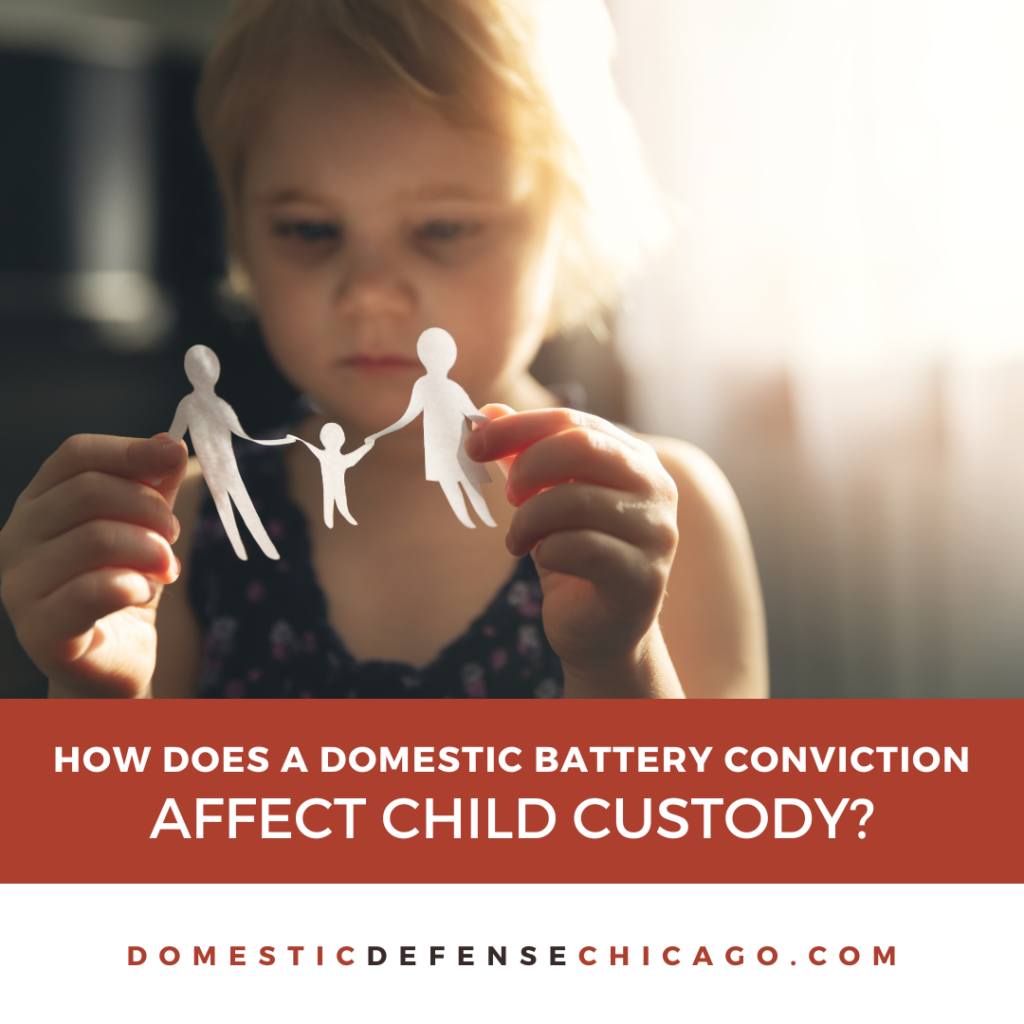A domestic battery conviction can have severe consequences on various aspects of your life, including child custody arrangements. If you are accused of committing domestic battery against your spouse or partner, it’s crucial to understand how this can impact your custody rights and what steps you can take to protect your relationship with your children.
How Does a Domestic Battery Conviction Affect Child Custody in Illinois?
In Illinois, a domestic battery conviction can significantly affect your child custody rights. Courts prioritize the safety and well-being of children when making custody decisions. This guide explains the following:
- The legal standards for child custody
- How a domestic battery conviction influences custody decisions
- The potential consequences of a conviction on custody
- Steps to protect your custody rights
- The importance of legal representation
Here’s a closer look at each.
The Legal Standards for Child Custody
Illinois courts determine child custody based on the best interests of the child. The court considers various factors, including each parent’s relationship with the child, the child’s needs, and the parents’ ability to provide a stable environment. The court aims to ensure that the child’s physical, emotional, and psychological well-being is protected. Any history of domestic violence, including domestic battery, is a critical factor in these determinations.
Related: Domestic battery charges in Illinois
How a Domestic Battery Conviction Influences Custody Decisions
A domestic battery conviction can significantly impact the court’s view of your ability to provide a safe and stable environment for your child. The court may see a conviction as evidence of violent or harmful behavior, which can affect your custody rights. Even accusations or arrests without convictions can raise concerns. The court may limit your custody or visitation rights, require supervised visitation, or, in severe cases, deny custody altogether. The court’s primary concern is the safety and well-being of the child.
The Potential Consequences of a Conviction on Custody
If you are convicted of domestic battery, you may face several consequences regarding child custody:
- Loss of Custody: The court may award sole custody to the other parent, limiting your involvement in major decisions about the child’s life.
- Supervised Visitation: The court may require that your visits with the child be supervised by a third party to ensure the child’s safety.
- Restraining Orders: The court may issue restraining orders that limit your contact with the child and the other parent.
- Impact on Future Modifications: A domestic battery conviction can impact your ability to modify custody arrangements in the future. The court may be hesitant to grant additional custody or visitation rights if there is a history of violence.
Steps to Protect Your Custody Rights
To protect your custody rights after being accused or convicted of domestic battery, you should take several steps:
- Comply with Court Orders: Follow all court orders and legal requirements, including restraining orders and supervised visitation rules.
- Complete Required Programs: If the court orders you to attend anger management, counseling, or parenting classes, complete them promptly and provide proof of completion.
- Document Your Actions: Keep records of your interactions with your child, including visits, phone calls, and any support provided. This documentation can help demonstrate your commitment to your child’s well-being.
- Maintain Positive Behavior: Avoid any actions or behaviors that could be interpreted as threatening or violent. Positive behavior can help rebuild trust and demonstrate your commitment to being a responsible parent.
The Importance of Legal Representation
Having a skilled lawyer is crucial when facing domestic battery charges and custody disputes. Your lawyer can help you understand your rights, navigate the legal process, and build a strong defense. They can also advocate for your custody rights and help present evidence that supports your ability to provide a safe and nurturing environment for your child. A lawyer can work to challenge false accusations and negotiate custody arrangements that protect your relationship with your child.
Related: How to get ready for a domestic battery trial
FAQ About Domestic Battery Convictions and Child Custody
Check out these commonly asked questions about how a domestic battery conviction can affect child custody in Illinois. If you don’t see your question here, please call our office and we’ll find you the answers you need.
Can a Domestic Battery Conviction Lead to Losing Custody of My Child?
Yes, a domestic battery conviction can lead to losing custody of your child. The court may award sole custody to the other parent and limit your involvement in the child’s life to protect the child’s safety.
What Is Supervised Visitation?
Supervised visitation means that your visits with your child are monitored by a third party to ensure the child’s safety. The court may order supervised visitation if there are concerns about your behavior or the child’s well-being.
Can I Modify Custody Arrangements After a Domestic Battery Conviction?
Modifying custody arrangements after a domestic battery conviction can be challenging. The court will consider your history of violence when making decisions about custody modifications. Completing court-ordered programs and demonstrating positive behavior can help.
How Can I Protect My Custody Rights If Accused of Domestic Battery?
To protect your custody rights, comply with court orders, complete required programs, document your actions, and maintain positive behavior. Working with a skilled lawyer can also help you build a strong defense to the charges.
Related: How to defend against false allegations of battery
Do You Need to Talk to an Attorney About Domestic Battery Defense?
If you need to talk to a domestic battery defense attorney in Illinois, we’re here to help. Call us at 847-920-4540 now – we’ll be happy to give you a free consultation and talk to you about your options.







Leave A Comment
You must be logged in to post a comment.